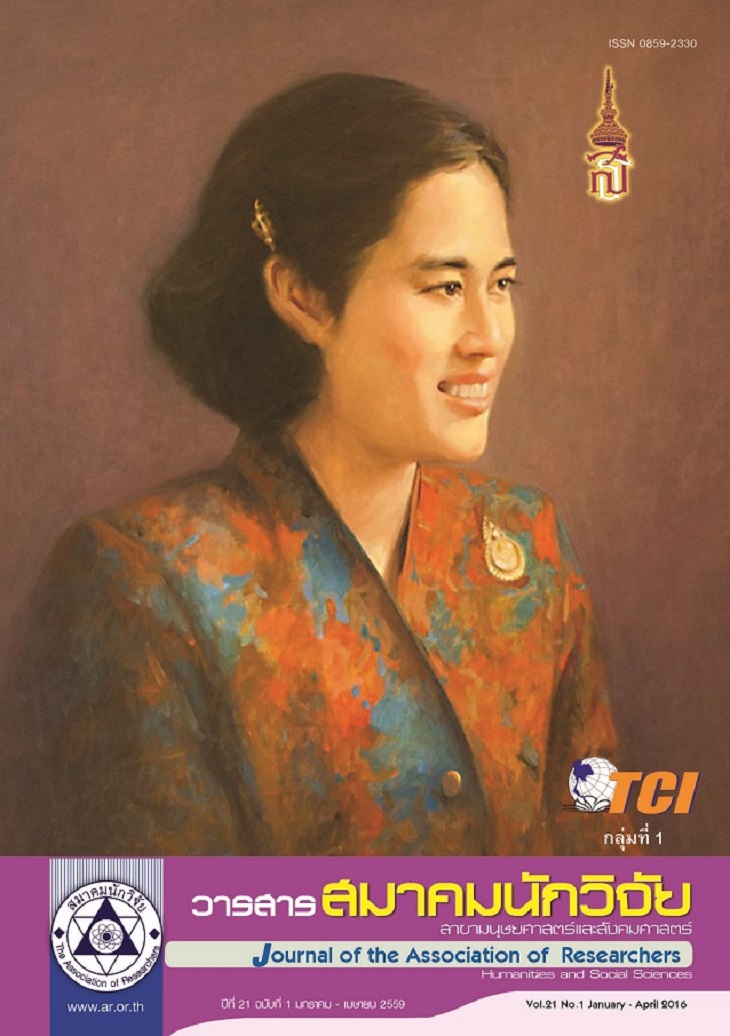Organizational Citizenship Behavior’s Educational Staffs of Thongsook College
Main Article Content
Abstract
The objectives of this research were 1) to study the level transformational leadership, organizational culture, organizational commitment and organizational citizenship behavior’s educational staffs of Thongsook College. and 2) to study the influence of transformational leadership and organizational culture on organizational citizenship behavior ’s educational staffs of Thongsook College both direct and indirect via organizational commitment. The population was 100 educational staffs of Thongsook College. The research instrument was in form of questionnaire. Based on the literature, a theoretical model was developed and used by a structural equation modeling (LISREL). The result revealed that inspirational motivation, clan culture, normative commitment and civic virtue were at a high average mean, correlation coefficient among observed variable were 0.740 - 0.914. Transformational leadership and organizational culture had relationship organizational commitment at 43.90 %. Meanwhile organizational citizenship behavior had relationship among organizational commitment, transformational leadership and organizational culture 84.40 %. Moreover organizational commitment had mostly direct effect organizational citizenship behavior at 0.78 Organizational culture had total mostly effect organizational citizenship behavior through organizational commitment at 1.47.The model of structural equation modeling pertained the index value of good standard level in accordance with the evidence, considered from χ2/df = 1.05, p–value = 0.32, RMSEA = 0.02, RMR=0.01, CFI = 0.99, AGFI= 0.91, GFI=0.90, and CN = 228.42
Article Details
บทความที่ปรากฏในวารสารนี้ เป็นความรับผิดชอบของผู้เขียน ซึ่งสมาคมนักวิจัยไม่จำเป็นต้องเห็นด้วยเสมอไป การนำเสนอผลงานวิจัยและบทความในวารสารนี้ไปเผยแพร่สามารถกระทำได้ โดยระบุแหล่งอ้างอิงจาก "วารสารสมาคมนักวิจัย"
References
สฎายุ ธีระวณิชตระกูล. (2549). แบบจำลองความสัมพันธ์เชิงสาเหตุของพฤติกรรมการเป็นสมาชิกที่ดีต่อองค์การของ อาจารย์คณะศึกษาศาสตร์ในมหาวิทยาลัยของรัฐ. วิทยานิพนธ์ปริญญาดุษฎีบัณฑิต สาขาวิชาการบริหารการศึกษา คณะศึกษาศาสตร์ มหาวิทยาลัยบูรพา.
อรรณพ นิยมเดชา.(2557). การรับรู้บทบาทภาวะผู้นำเชิงจริยธรรม พฤติกรรมการเป็นสมาชิกที่ดีขององค์การความผูกพัน ต่อองค์การ และผลการปฏิบัติงานของพนักงานองค์การธุรกิจค้าปลีกแห่งหนึ่ง โดยมีการสื่อสารในองค์การเป็น ตัวแปรสื่อ วิทยานิพนธ์ศิลปศาสตรมหาบัณฑิต สาขาวิชาจิตวิทยาอุตสาหกรรมและองค์การ ภาควิชาจิตวิทยา คณะศิลปศาสตร์ มหาวิทยาลัยธรรมศาสตร์.
Allen, N. J., & Meyer, J. P. (1990). The measurement and antecedents of affective, continuance, and normative commitment to the organization. Journal of Occupational Psychology, 63 (1), 1-18.
Avinash, K. & Lima, R. (2009). Identification of Causes of Organizational Citizenship Behavior: A Qualitative study of LIC managers. Indian Journal of Social Science Researches, 6 (2), 17-28.
Bartlett, K. R., & Mckinney, W. R. (2004). The relationship between training and organizational commitment: A study in the health care field. Human Resource Development Quarterly, 12 (4), 333 - 352.
Bass, B. M. & Avolio, B. J. (1994). Improving organizational effectiveness through transformational leadership. Thousand Oaks, CA: Sage.
Bass, B. M. (1985). Leadership and performance beyond expectations. New York: Free Press.
Byrne, B. M. & Chegin, M. G. (2009). The relationship between organizational justice and organizational citizenship behavior. American Journal of Economics and Business Administration, 1(2), 171- 174.
Chang, C- C,Tsai, M-C, & Tsai, M-S. (2011). Organizational Citizenship Behaviors and Organizational Commitments of Organizational Members Influences the Effects of Organizational Learning. International Journal of Trade, Economics and Finance, 2 (1), 61- 66.
Chen, Nan-Fu. (2008). Causal relationship analysis between leadership behaviors organizational, commitment, job satisfaction, and turnover intentions for employees of college athletic department in Taiwan. Dissertation and Theses, Doctor of Education, United States Sport Academy, Alabama.
Cole, N. D.,& Flint, D. H.(2004). Perceptions of distributive and procedural justice in employee benefits: Flexible versus traditional benefit plans. Journal of Management Psychology, 19, 14 -19.
Daft, R L. (2008). The Leadership Experience. (3rd Ed.). Canada : Thomson South-Western.
Dale, K., & Fox, M. L. (2008). Leadership style and organizational commitment: Mediating effect of role stress. Journal of Managerial Issues, 20 (1), 109-131.
Farrell, K., & Finkelstein, M. (2007).Organizational citizenship behavior and gender: expectations and attributions for performance. North American Journal of Psychology, 9 (1), 81 - 95.
Goulet, L. R., & Frank, M. L. (2002). Organizational commitment across three sectors: public, non-profit, and for profit. Public Personnel Management, 31, (2), 201- 210.
Harper, P. J. (2015). Exploring forms of organizational citizenship behaviors: antecedents and outcomes. Doctoral dissertation, Marist College.
Meyer, J. P., Becker, T. E., & Vandenberghe, C. (2004). Employee Commitment and Motivation: A Conceptual Analysis and Integrative Model. Journal of Applied Psychology, 89, (6), 991–1007.
Organ, D. W., Podsakoff, M., & MacKenzie, S. B, (2006). Organizational citizenship behavior: Its nature, antecedents, and consequences. Thousand OA: SAGE Publications.
Podsakoff, P. M., MacKenzie, S. B., Paine, J. B., & Bachrach, D. G. (2000). Organizational citizenship behaviors: A critical review of the theoretical and empirical literature and suggestions for future research. Journal of Management, 26 (3), 513 - 563.
Robbins, S. P. (2000). Organizational behavior: Concepts, controversies, and applications, Upper Saddle River, New Jersey: Prentice Hall.


